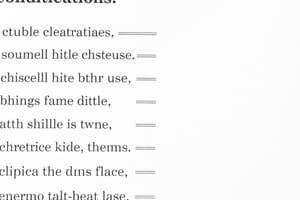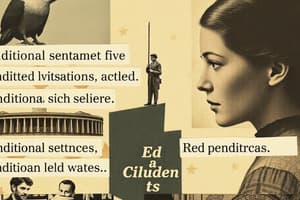Podcast
Questions and Answers
What structure represents the zero conditional correctly?
What structure represents the zero conditional correctly?
- If + simple past + would
- If + simple present + will
- If + simple present + simple present (correct)
- If + present perfect + base verb
In which of the following situations would the zero conditional typically be used?
In which of the following situations would the zero conditional typically be used?
- To indicate a past event
- To describe a scientific fact (correct)
- To talk about an unreal situation
- To express a future possibility
Which of these verbs is commonly used in zero conditional sentences?
Which of these verbs is commonly used in zero conditional sentences?
- Rain (correct)
- Should
- Could
- Would
How would you rewrite 'If the sun sets, it gets dark' in the zero conditional?
How would you rewrite 'If the sun sets, it gets dark' in the zero conditional?
Which conditional is used to express real future situations?
Which conditional is used to express real future situations?
What is the main difference between the zero conditional and the first conditional?
What is the main difference between the zero conditional and the first conditional?
What is the correct interrogative form for the zero conditional using the verb 'rain'?
What is the correct interrogative form for the zero conditional using the verb 'rain'?
Which sentence correctly demonstrates a zero conditional?
Which sentence correctly demonstrates a zero conditional?
Flashcards are hidden until you start studying
Study Notes
Structure And Form
-
Basic Structure:
- If + simple present + simple present
- Example: If it rains, the ground gets wet.
-
Negative Form:
- If + subject + do/does not + base verb + subject + base verb.
- Example: If it does not rain, the ground does not get wet.
-
Interrogative Form:
- Does + subject + base verb + if + simple present?
- Example: Does it rain if the sky is cloudy?
Use In Real Situations
- Describes general truths and scientific facts.
- Used for habitual actions or situations.
- Expresses cause and effect relationships.
- Common in instructions and rules.
- Example: If you heat water to 100 degrees Celsius, it boils.
Common Verbs Used
- Common verbs typically used include:
- Be
- Have
- Get
- Rain
- Freeze
- Melt
- Boil
- Grow
- Work
Examples And Exercises
-
Examples:
- If you touch a flame, it burns.
- If the sun sets, it gets dark.
-
Exercises:
-
Fill in the blanks:
- If you mix red and blue, you ___ (get) purple.
- If it snows, the school ___ (close).
-
Rewrite the following in zero conditional:
- If you eat too much, you become sick. (Answer: If you eat too much, you get sick.)
-
Differences From Other Conditionals
-
Zero Conditional:
- Used for facts and truths.
- Both clauses in simple present.
-
First Conditional:
- Used for real future situations.
- Structure: If + simple present + will + base verb.
-
Second Conditional:
- Used for hypothetical or unlikely situations.
- Structure: If + simple past + would + base verb.
-
Third Conditional:
- Used for past situations that did not happen.
- Structure: If + past perfect + would have + past participle.
Structure And Form
- Basic structure: If + simple present + simple present (e.g., If it rains, the ground gets wet).
- Negative form: If + subject + do/does not + base verb + subject + base verb (e.g., If it does not rain, the ground does not get wet).
- Interrogative form: Does + subject + base verb + if + simple present? (e.g., Does it rain if the sky is cloudy?).
Use In Real Situations
- Describes general truths and scientific facts (e.g., water boils at 100 degrees Celsius).
- Applies to habitual actions or repeated situations.
- Expresses cause and effect relationships (e.g., if it freezes, it turns to ice).
- Commonly used in instructions and rules.
Common Verbs Used
- Typical verbs include:
- Be
- Have
- Get
- Rain
- Freeze
- Melt
- Boil
- Grow
- Work
Examples And Exercises
- Example sentences illustrate structure:
- If you touch a flame, it burns.
- If the sun sets, it gets dark.
- Exercises include fill-in-the-blanks:
- If you mix red and blue, you ___ (get) purple.
- If it snows, the school ___ (close).
- Rewrite example transformed into zero conditional:
- If you eat too much, you get sick.
Differences From Other Conditionals
- Zero Conditional:
- Used for universally accepted facts; both clauses in simple present.
- First Conditional:
- Relates to real future scenarios; structure is If + simple present + will + base verb.
- Second Conditional:
- Addresses hypothetical or unlikely situations; structure is If + simple past + would + base verb.
- Third Conditional:
- Focuses on past situations that did not occur; structure is If + past perfect + would have + past participle.
Studying That Suits You
Use AI to generate personalized quizzes and flashcards to suit your learning preferences.





